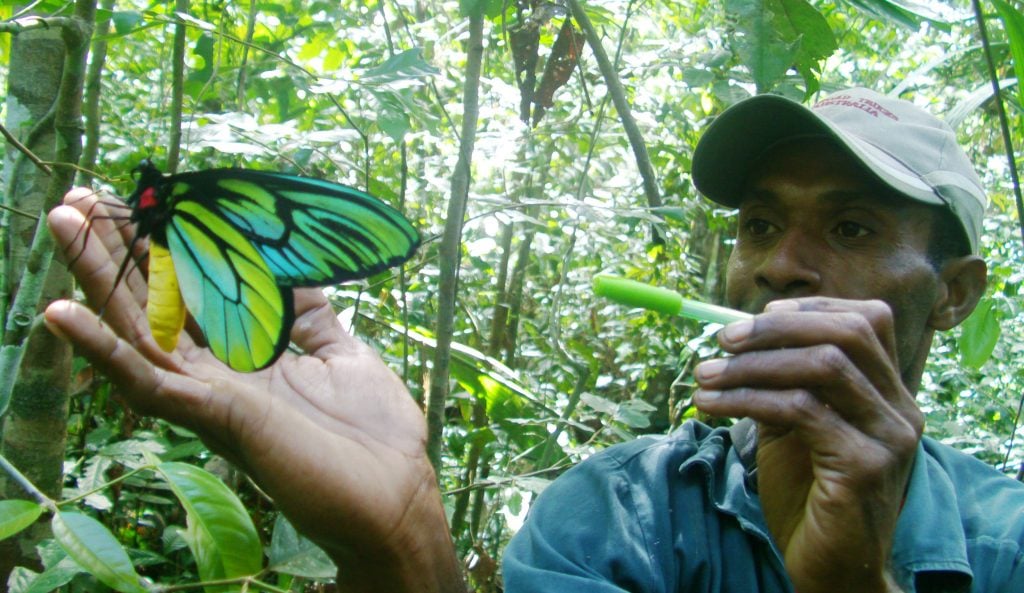Black queen is probably pissed lmao


Queen Alexandra’s Birdwing: Ornithoptera alexandrae IUCN Red List Conservation Status: Endangered
Queen Alexandra’s Birdwing (Ornithoptera alexandrae), is the largest and arguably the most beautiful butterfly in the world. This magnificent species, in which the female may have a wingspan of up to 30cm, was discovered in Papua New Guinea by Albert S. Meek, naturalist to Walter Rothschild, in 1906, and named by Rothschild in 1907 after the wife of Edward VII and mother of George V, (5). Protected by law in Papua New Guinea since 1966, and listed on CITES Appendix I in 1987, this species is severely restricted in its distribution as a result of habitat loss caused by large-scale logging, expanding smallholder agriculture, and oil palm planting.
Description:
Male: The male is smaller than the female (wingspan 147-200 mm) and is predominantly black with large areas of iridescent blue/green colour. In both sexes, the head and thorax are black being distinctly red anteriad; the abdomen is bright yellow (2, 4, 6, 8); the upper forewing is elongated, black with a long, broad, green radial band, a broad, blue-green anal band fused at both ends with a narrower cubital band to enclose a large, black sex band. The lower part of the forewing is blue-green with more blue towards the anal region; there are black veins, a narrow margin and sub-apical streaks. The hindwing is elongated, with a black background, sub-marginal cell and wing margin. There is a broad, blue-green submarginal band, which is continued to the base along the costal and inner margins; blue-green anal cell; underside of the hindwing is yellow, with black veins narrowing at the margins. Males are sometimes confused with O. priamus (6, pp. 10-11).
Female: The females are predominantly dark brown with an average wingspan of 200mm (187-300), with the largest females coming from the remote Managalas Plateau. The female is often confused with O. priamus (2, 4, 6, 8).
The forewing is dark brown with relatively small, light submarginal and discal spots becoming smaller towards the apex. The hindwing is elongated, with a band of seven pale grey, yellow-powdered, wedge-shaped pale patches separated by broad black bands over the veins. All but the innermost cells contain brown discal spots, and all are more yellow on the upper hindwing.
Distribution
At best, the distribution of alexandrae can only be described as fragmented (6).
The preferred habitat is open secondary forest either in or near the Popondetta Plain, or on the remote Managalas Plateau in the Northern Province of Papua New Guinea (PNG). The first specimen, a small, atypical female, was collected in January 1906 from the type locality near Biagi at the headwaters of the Mambaré River (photo in 6), well outside its present range (3, 5, 6, 8). This butterfly is known from only four sub-populations; all are on the northeast coastal region of PNG (6, pp. 34)). It had been reported that the 1951 eruption of Mt Lamington destroyed 250sq. km of prime habitat, further fragmenting the already patchy distribution of alexandrae.
For a map showing the distribution click here.
Everyone vote for this one, I want to see how it is interpreted.
WTF, that notification just stole my entire screen
What the hell am I supposed to do for this!??
Butterflies are coool
tldr: it flutters prettily hither and thither, and is now, alas, almost completely extinct
black pawns unionize and refuse to participate in battle until they get better healthcare
White queen thinks her husband is cheating and hooks up with the black queen, Queen to D8. It’s now queens against kings.
Made this and misunderstood, white queen doesn’t do it cause of cheating and somehow convinced black queen to divorce as well.
You meen Queen to C8? or maybe E8?
Maybe, or maybe they’re already very close
Both kings fall in love and have a brokeback mountain relationship where one of the rooks finds out and black queen is sus
30% of all pawns die of plague
Kings develop hobby in animal husbandry, mate their dark squared horses
White Pawns hold a vote to remove the White king. Black pawns vote in disguise to remove him.
Pawns are unhappy with the Kings decision to host enemy King and take on pitchforks.








